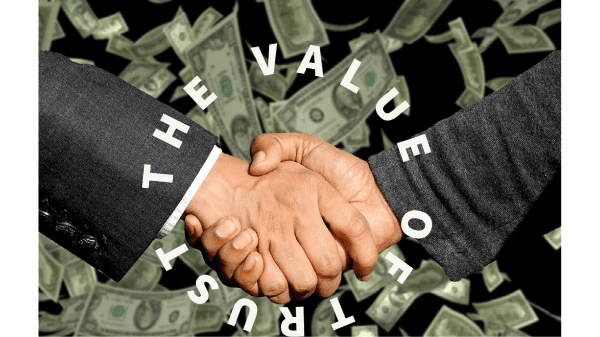American business is relentlessly—often excessively—quantitative. If it can’t be measured, it might as well not exist.
This foolish mentality has led some businesses to squander perhaps their most important asset: trust.
The list of companies that have done so in recent years would be otherwise distinguished: Volkswagen, Wells Fargo, and Uber.
Actually, the value of trust can be quantified, and it’s high. According to a 2018 article in The Economist, “these episodes were deeply injurious to the companies’ financial health, with the median firm losing 30% of its value since its crisis, when compared with a basket of its peers.”


You could say that the trust you enjoy constitutes 30 percent of your company’s value.
Can trust be regained? Yes, says Sandra J. Sucher of the Harvard Business School. She and Shailene Gupta are author of a new book, The Power of Trust: How Companies Build It, Lose It, Regain It.
An article on the HBS website quotes Sucher: “To turn that picture around, business leaders must establish trust with customers, employees, and investors by being ‘the real deal,’ creating valuable products and services, acting on good intentions, treating people fairly, and taking responsibility for how an organization impacts business and society. And, at a time when the U.S. political landscape is bitterly divided and the COVID-19 pandemic has shaken the economy and led to widespread job losses globally, a corporate focus on trust may be more important than ever.”
Successful companies build trust by focusing on four areas, the authors write: competence, motive, means, and impact.
If a company has blown it, in whatever way, the first thing it needs to do is apologize—to customers, employees, and the general public.
“It’s shocking the number of companies that don’t apologize,” Gupta says. “They think it’s an admission of guilt.”
To learn how trust operates in the produce industry, I turned to Doug Nelson, vice president and trading assistance manager for Blue Book.


His reply corroborates the more general advice of Sucher and Gupta: “I think there’s a difference between a ‘do-not-sell’ list and a ‘never again’ list.
“When a firm runs into financial trouble and can’t pay for product, that’s going to land them on do-not-sell lists. But if they are honest about what happened and what they are doing to resolve the matter, that buyer can probably rebuild trust once it can show an improving financial picture.
“On the other hand, when a delinquent buyer goes silent or starts making false excuses for not paying, that’s when a buyer is likely to find itself on never-again lists. I’m not sure it’s possible to get off a seller’s never-again list.
“Financial trouble doesn’t necessarily speak to the buyer’s character, but gaslighting and disappearing acts—those are much harder to overlook.”
People will forgive honest errors and misfortunes caused by factors such as the pandemic or default by a debtor. They’re not going to forgive sleazy business practices.
A company that gets into trouble has to prove that it’s not in the second category.
I pray with all my heart that you’re not learning it for the first time here: it’s always a bad idea to do business with crooks.



